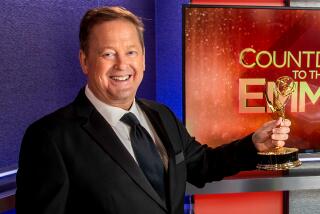Despite a Harrowing Past, He’s Full of Smiles and Leading the Parade
- Share via
The curse of newsprint is that it can’t bring you the full-blooded, profanely and poignantly funny, colorized force of nature that is 76-year-old Tibor Rubin. But here goes.
“Welcome to the Casbah,” he says as he answers the bell at his modest Garden Grove home. “You’re going to have a good time with me. If not, I give you your money back.” He’s wearing a T-shirt and sweatpants, and after I jokingly tell him he didn’t have to dress up, he says in his thick Hungarian accent, “I washed up. I cleaned up nice. The Army, you know, teached me.”
Ah, but the unassuming one has a story to tell. It spans the years of World War II concentration camps to last September in the White House with President Bush. Its grandeur is such that it almost sounds jokey that it has landed him a spot Saturday as Theme Grand Marshal in the annual Garden Grove Strawberry Festival parade.
The festival is paying tribute to Rubin, and he concedes he’s looking forward to waving a flag to the crowd and blowing kisses. Just like a big shot.
He didn’t feel like a big shot in 1945, when as a boy of 15 he was well into his second year in the Mathausen concentration camp in Austria. His parents and a younger sister died in other camps. Normal youthful optimism didn’t come into play, he says, “when you see every day the piles of corpses.”
In May 1945, the 11th Armored Division of the U.S. Army liberated the camp, and Rubin was reborn.
“I promised myself if the Lord helped me go to America,” he says, “I’d join the Army and become a G.I. Joe and repay the U.S. for what they did for me.”
That came in 1948. After flunking two entry tests because he couldn’t understand a word of English, he passed the third time, enlisted and eventually won a ticket to Korea and another war.
That’s where he repaid the debt. He says his sergeant, a Southerner, didn’t particularly like Jews and referred to Rubin as “the funny-talking s.o.b. Hungarian Jew.” He heard it so many times, Rubin jokes, he forgot what his real name was.
During his first week in Korea, he was scared stiff. “Then I said to myself, ‘The Lord loves you. If he let you out of the concentration camp, he’s not going to let you get killed here.’ And I wanted to show the sergeant that we Jews can fight.”
The sergeant gave him the chance. Over and over.
One night, while defending a hill alone as other troops retreated and regrouped, Rubin says he began singing a Jewish song, which, he says, roughly translates to “You ask the Lord to save your ass. I prayed to Jesus, Muhammad and Buddha, saying, ‘Could you guys get together and save my ass?’ ”
He’s telling the stories with a comic’s aplomb, and I’m laughing. Several times, he begins a story by saying to me, “Are you listening good?” I nod, and off he goes again.
The next stop, for 2 1/2 years, was a prisoner-of-war camp. There, he says, guided by what he learned from Jewish elders in the concentration camp, he helped wounded and diseased soldiers cope by putting “mind over body.”
The stories sound incredible, but they aren’t made up.
In September, 55 years after his fellow soldiers first submitted his name, Rubin received the Medal of Honor, the nation’s highest military accolade, from President Bush.
Showing me a photo of him and the president, Rubin refers to “the little midget and the nice-looking guy.”
At the White House ceremony, Bush said, “By repeatedly risking his own life to save others, Cpl. Rubin exemplified the highest ideals of military service.”
Some of Rubin’s surviving comrades told a Times reporter that Rubin, who had been nominated numerous times for top military honors, was overlooked because of his sergeant’s anti-Jewish bias.
The White House official who first notified Rubin of the medal referred to him as “Mr. Tibor Rubin, sir,” Rubin recalls. “He called me sir. I told him, ‘First I was a schmuck, then a corporal, then a country boy.’ He said, ‘You are no more a schmuck.’ ”
Rather, the White House caller told him, five-star generals and presidents would salute him.
I can’t talk to Rubin without thinking of the miles he’s covered from Paszto, Hungary, to Garden Grove. And how he refused to let all manner of indignities and fears and traumas do him in.
With it all behind him, I asked if it really mattered that he got the medal. Oh, yes, he says. “We Jews are always getting the ... kicked out of us, so I wanted to have it.”
He’s smiling as he says it.
More to Read
Sign up for The Wild
We’ll help you find the best places to hike, bike and run, as well as the perfect silent spots for meditation and yoga.
You may occasionally receive promotional content from the Los Angeles Times.






